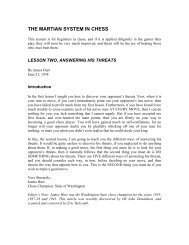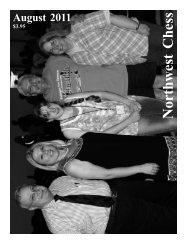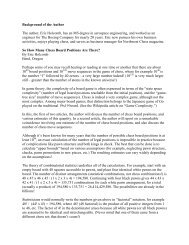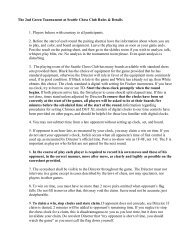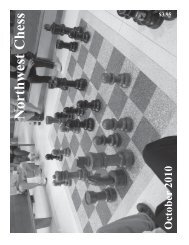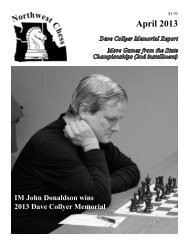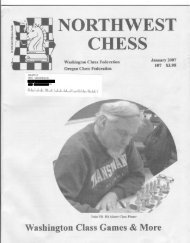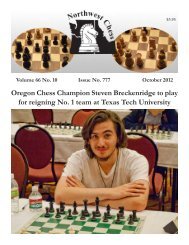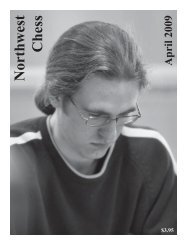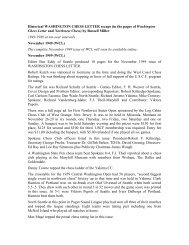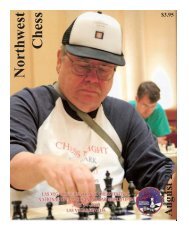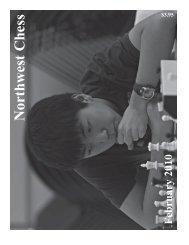January, 2012 - Idaho Chess Association
January, 2012 - Idaho Chess Association
January, 2012 - Idaho Chess Association
You also want an ePaper? Increase the reach of your titles
YUMPU automatically turns print PDFs into web optimized ePapers that Google loves.
participated in the Hungarian Grade-Level<br />
National <strong>Chess</strong> Championship, where I<br />
played Peter, the top-rated kid in this age<br />
group. In that game, I attacked carelessly<br />
in the early middle-game, and ended up<br />
down a pawn; he maintained a slight advantage<br />
all the way into the endgame and<br />
won. Even though I did okay in that tournament<br />
(I got third place), I really wanted<br />
to win this re-match against Peter.<br />
I remembered his style. He is a passive<br />
player, who prefers closed positions<br />
and waits for the opponent to start something,<br />
and make a mistake. The question<br />
was: How can we open up the game? My<br />
coach, IM Istvan Sipos suggested that I<br />
try the King's Indian, London System.<br />
Even though I know some of the King's<br />
Indian lines, the London System was brand<br />
new to me. We had half a day to prepare<br />
by looking at some GM games and playing<br />
through some possible variations with<br />
Coach Khodarkovsky. As the game<br />
shows, we managed to open up the position,<br />
which I think was a key factor.<br />
A48 London System<br />
Peter Czina (HUN, 1728)<br />
Marcell Szabo (USA, 1676)<br />
Caldas Novas, World Youth U10 (7) 2011<br />
Annotations by Marcell Szabo<br />
1.d4 ¤f6 2.¥f4 g6 3.¤f3 ¥g7 4.h3<br />
O-O 5.e3 d6 6.¥e2 c5 7.O-O £b6<br />
8.¤c3 £xb2<br />
I guess he thought I would not take<br />
the pawn, because it is poisoned: maybe<br />
there is a danger of trapping my Queen.<br />
But I calculated that it could not be<br />
trapped. I also knew that, with accurate<br />
play, he will get the pawn back, but my<br />
goal was not to get ahead in material, but<br />
to open up the position and force him to<br />
play in a style that I like and he doesn't.<br />
9.¤b5 ¤a6 10.a3 ¥f5 11.¥d3<br />
<strong>Chess</strong>4Life Ad<br />
Photo by Csaba Szabo<br />
Morning preparation with Michael Khodarkovsky, my USCF-assigned coach<br />
¥xd3 12.£xd3 c4 13.£xc4 ¦fc8<br />
14.¦a2 ¦xc4 15.¦xb2<br />
We are even on material, but I saw<br />
that his Knight was trapped.<br />
15...¤d5 16.¥g3 ¤b8 17.¤d2<br />
¦c6 18.c4 ¤b6 19.¦c1 ¤8d7 20.<br />
¤c3 ¦ac8<br />
XABCDEFGHY<br />
8-+r+-+k+(<br />
7zpp+nzppvlp'<br />
6-snrzp-+p+&<br />
5+-+-+-+-%<br />
4-+PzP-+-+$<br />
3zP-sN-zP-vLP#<br />
2-tR-sN-zPP+"<br />
1+-tR-+-mK-!<br />
xabcdefghy<br />
21.¤e2?<br />
When he made this move, I knew<br />
that I would be up by a pawn.<br />
21...d5 22.c5 ¤xc5 23.¦bc2 ¤d3<br />
24.¦xc6 ¦xc6<br />
25.¦xc6 bxc6<br />
Exchanging<br />
Rooks was good<br />
for me, because I<br />
went into an endgame<br />
with a pawn<br />
up. This was very<br />
similar to what<br />
happened in Hungary<br />
this summer,<br />
except this time, I<br />
was the one who was up by a pawn.<br />
26.¤c3 c5 27.dxc5 ¥xc3 28. cxb6<br />
axb6 29.¤b3 e5 30.¢f1 ¥b2<br />
31.a4<br />
He should have played 31.¢e2.<br />
31...¥c3 32.¤d2 ¤b2<br />
I saw 32...¥xd2 33.¢e2 ¤xf2 34.<br />
¥xf2 ¥b4, winning another pawn, only<br />
after I made my move.<br />
33.¤b1 ¤xa4 34.¤xc3 ¤xc3 35.<br />
¥xe5 ¤a4 36.¢e2 ¢f8 37.¢d3<br />
¢e7 38.¢d4 ¢e6 39.¥c7 ¢d7 40.<br />
¥e5 ¢c6 41.e4<br />
I think he got tired or lost his confidence<br />
by this point. Taking the pawn got<br />
rid of my only weakness.<br />
41...dxe4 42.¢xe4 ¢c5 43.¥a1<br />
¢d6 44.¥e5+ ¢e6 45.¥a1 ¤c5+<br />
46.¢e3 ¢d5 47.¢f4 ¤d3+ 48.¢e3<br />
¤e1<br />
I was going to play 48...¢c4, but then<br />
saw a little trick.<br />
49.g3?? ¤c2+ 50.¢f4 ¤xa1 51.<br />
¢g5 b5 52.¢h6 b4 53.¢xh7 b3 54.<br />
f4 b2 55.f5 b1=£ 56.g4 gxf5 57.<br />
g5 f4+ 58.¢h8 £g6 59.h4 £h5+<br />
60.¢g7 ¢e6 61.¢g8 f3 62.g6<br />
£xg6+ 63.¢f8<br />
If 63.¢h8, there is mate in three:<br />
63...£h5+ 64.¢g8 ¢f6 65.¢f8 £h8<br />
mate.<br />
63...£h7 1-0<br />
n<br />
6 <strong>January</strong> 2011 Northwest <strong>Chess</strong>



